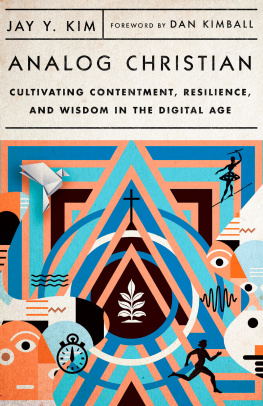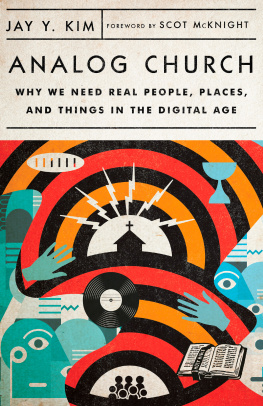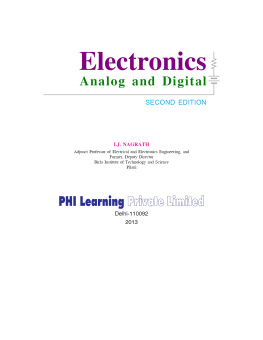Sommaire
Pagination de l'dition papier
Guide
Analog Christian
Cultivating Contentment, Resilience,
and Wisdom in the Digital Age

Jay Y. Kim
FOREWORD BY DAN KIMBALL
 InterVarsity Press
InterVarsity Press
P.O. Box 1400 | Downers Grove, IL 60515-1426
2022 by Jay Y. Kim
All rights reserved. No part of this book may be reproduced in any form without written permission
from InterVarsity Press.
InterVarsity Press is the publishing division of InterVarsity Christian Fellowship/USA.
For more information, visit intervarsity.org.
All Scripture quotations, unless otherwise indicated, are taken from The Holy Bible, New International
Version, NIV. Copyright 1973, 1978, 1984, 2011 by Biblica, Inc. Used by permission of Zondervan.
All rights reserved worldwide. www.zondervan.com. The NIV and New International Version are trademarks registered in the United States Patent and Trademark Office by Biblica, Inc.
While any stories in this book are true, some names and identifying information may have been changed to protect the privacy of individuals.
figures used on the part pages are used with permission, courtesy of Jessie Barnes.
folded by and used with permission of Nguyen Nam Sn.
The publisher cannot verify the accuracy or functionality of website URLs used in this book beyond the date of publication.
Cover design and image composite: David Fassett
ISBN 978-1-5140-0317-6 (digital)
ISBN 978-1-5140-0316-9 (print)
This digital document has been produced by Nord Compo.
For Harper,
my favorite author.
Foreword
DAN KIMBALL
W eve all heard the various news reports or seen documentaries on both the positive and negative effects of living in the digital age. I am super grateful for technology and digital forms of communication and the ways they help and benefit us. But we are also now seeing how many of the creators and designers of digital technology and social media are sounding alarms about its negative and even dangerous effects. We are now being warned how our viewpoints, beliefs, and emotions can be manipulated and even changed. If we arent careful, we can end up believing things that arent true with the onslaught of disinformation constantly coming in. Its been shown how our self-worth and even how we understand our identity is affected by social media. Thankfully, these dangers are now being talked about, and warnings are being given to us.
But we must also pay attention to how living in the digital age impacts our spiritual lives. How does it affect how we think of God? How does it affect how we think God thinks of us? How does it affect how we understand who we are as human beings created in his image? How is it shaping how we define what love is, and is this definition of love different from the way the Scriptures define it? How is our understanding of community being changed? How does it affect our understanding of church? Or what worship is? How are we being spiritually formed in the digital age in ways we may not even realize? And is this shaping that is occurring in alignment with the truths of Scripture or not?
These are important questions. They not only affect this life, but they have eternal impact. How we think of God really matters. How we think of salvation really matters. The decisions we make regarding who we choose to follow and trust for our salvation are based on our thinking and beliefs. We better, then, be paying attention to how our thinking and spiritual beliefs are being impacted living in the digital age. It is now widely agreed that technology can shape our emotions and thinking in ways that cause us to believe things that arent true. We then act with our lives and decisions based on our beliefs and emotions. To what degree are our beliefs and emotions being altered and shaped by living in the digital age? And are they in alignment with the truths of Scripture or not? How do we know we arent being subtly shaped by the influences into a form of Christian living and thinking that doesnt align with Scripture? Its a pretty urgent discussion to be having for so many, many reasons.
Thankfully, Jay Kim is a prophetic voice coming from deep in the heart of Silicon Valley. Jay grew up immersed in the very place where so much of our digital world has been designed and created. What you will find in this book is not an anti-technology or anti-digital world rant. What you will find is a thoughtful, biblical look at how technology forms us spirituallyboth the good and the bad.
What you will read here comes from a mind and heart that is first and foremost immersed in the Scriptures. The Scriptures are the truths God has given us to guide our minds and emotions to understand what it true and good. I know Jay as a close personal friend, and I can attest that the foundation for all he writes here is not of his own opinions. This book stems from a life that is deeply passionate about God, steeped in his Word, with deep prayer and deep thinking. Jay evaluates and scrutinizes all he thinks and writes through the lens of the whole of the Scriptures.
The Scriptures teach in Philippians 4:8, Finally, brothers and sisters, whatever is true, whatever is noble, whatever is right, whatever is pure, whatever is lovely, whatever is admirableif anything is excellent or praiseworthythink about such things.
I am so glad you are reading this book. It shows you want to learn about how to follow Jesus and to discern enough to know we are living in a different age than ones past. That means we need to have the sensibilities and skills to be cautious in new ways to ensure we are following the true path in the truest way.
Its interesting to learn the very ones in Silicon Valley who invented and designed social media and other digital forms of communication are now, out of care, limiting their family usage of it. Many of the tech giants have stopped using some forms of digital technology as they have become aware of the downside of it. Because the creators of the digital world care about their families and their workplace, they have made changes where needed. If we care about our spiritual lives and walk with Jesus, we now have a resource and guide to help us become aware of changes we may need to make. I am thankful to Jay for providing us Analog Christian; its exciting to think how many lives will be helped to grow and flourish as a result.
Introduction
Digital Smoke, Analog Air, and Fruit
I n the 1940 s , smoking cigarettes was the norm for most men and women in America. But rising public health concerns threatened to bring tobacco companies to their knees. In response, Camel cigarettes hired the William Esty advertising agency to launch a nationwide campaign called More Doctors, featuring the slogan More doctors smoke Camels than any other cigarette. The campaign touted surveys conducted by independent research firms, involving more than one hundred thousand doctors from every branch of medicine. In reality, the survey was conducted by the advertising agency itself, and every respondent was asked about their cigarette of choice while being handed complementary cartons of Camels.











 InterVarsity Press
InterVarsity Press